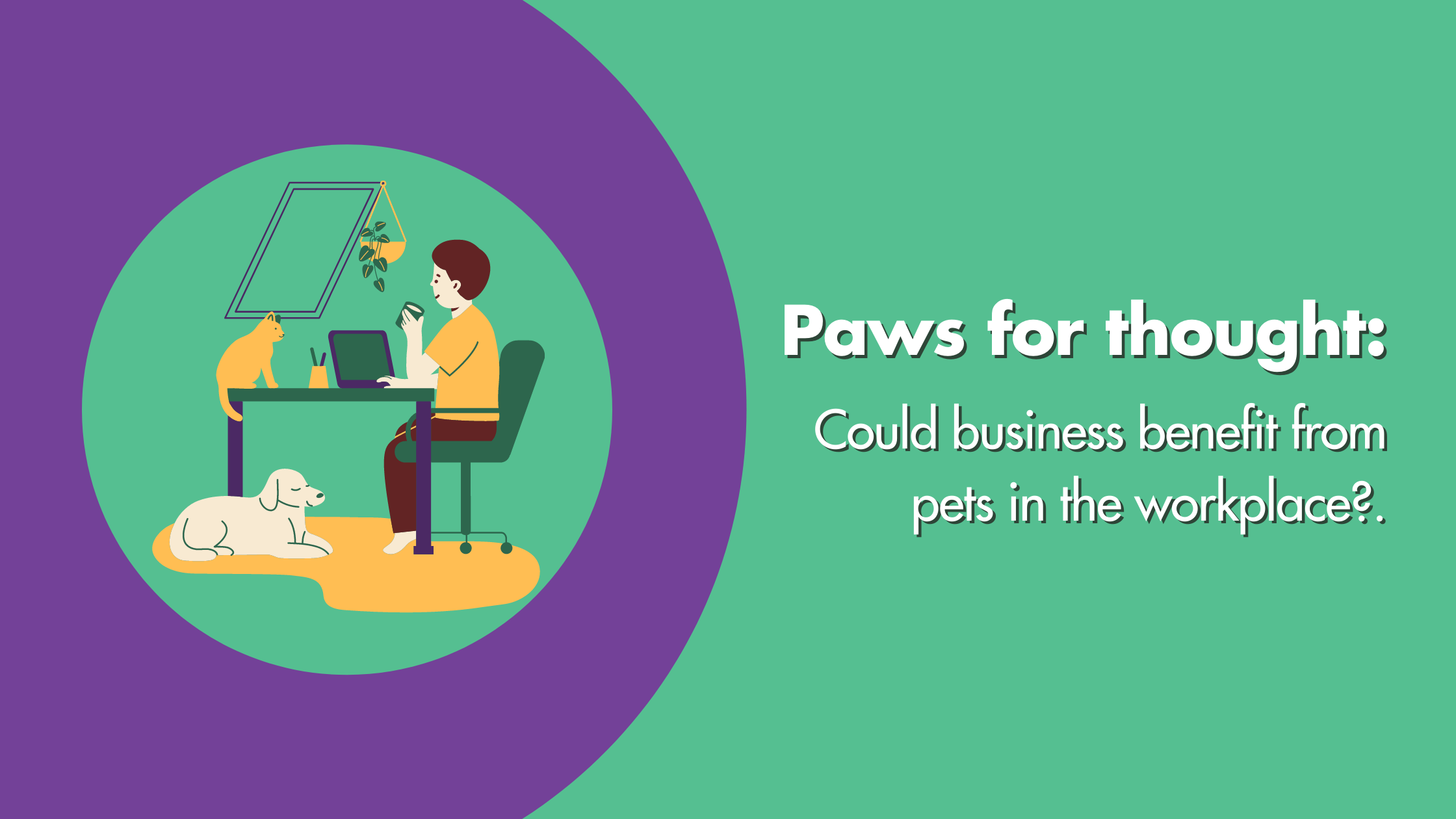As the nation returns to the workplace, furry companions are seemingly in demand. According to a recent survey, 42% of employees are hoping to bring their pet into the office! The demand for a better work-life balance is becoming increasingly apparent, and one way some companies are doing this is by allowing staff to bring pets into the workplace.
Over the course of the lockdown, 3.2 million pets were adopted in the UK. This is an unprecedented boom in pet ownership. But what happens when lockdown ends? This is now the question being asked by workers as they face leaving their pets at home for the first time.
Offering your staff the opportunity to have their pets in the workplace can really make a difference, not only for the welfare of the animals but also for the overall wellbeing of your employees!
In this article, we are looking at why there is a growing demand for pet-friendly workspaces; the pros and cons of this policy; and outline the ground rules employers can follow to establish a paw-fect transition into the workplace.
Are you looking for help establishing the right employee benefits for your staff? Contact our friendly team at hello@hoorayinsurance.co.uk or use the chat box in the bottom right.
Why the pets in the workplace policy is becoming more popular
The main factor behind this massive boost in pet ownership, and in turn the greater demand for employers to implement a pets-in-the-workplace policy, all circles back to the pandemic. What doesn’t nowadays?
It’s safe to say that most people in the UK felt a sense of loneliness during the pandemic. Adopting a furry friend was one way out of this – 74% say their pet has helped their mental health during the pandemic.
However, it has also raised concerns around pet welfare. Having a pet whilst you’re at home 24/7 seems like a logical approach to curing loneliness. But how does this coexist with a return to the office five days a week?
MetLife’s Pet Insurance Pet Parent Pulse survey, outlined the challenges these employees are facing:
- 95% anticipate the transition back to offices will cause a change in pet routines/impact the overall health of pets
- 29% expect to adjust their working hours
- 20% are considering taking the pet to a shelter/finding it a new home
Offering employees a pets in the workplace policy is becoming an increasingly popular solution, as it’s a way of addressing issues around work-life balance, and ensuring staff feel settled and content.
“Many of our pets are now used to having us around all the time, while others have never known any different. We have real concerns that life post-lockdown, both in terms of a new routine and spending time alone, could be really difficult for them to adjust to, which is why it’s so important that owners start to prepare them now” – Samantha Gaines, RSPCA Pet Welfare Expert
The pros
Many businesses are already allowing pets full access to the office, including the likes of Google and Zynga. So there’s clearly a business case worth considering. Below, we have broken down a list of benefits that these furry creatures can bring to your organisation.
Team bonding:
Having a pet in the workplace improves the overall atmosphere by encouraging positive dialogue, interaction, and teamwork between colleagues. Pets help staff bond and act as great icebreakers!
In turn, employees will feel more motivated to produce their best work in more collaborative and encouraging office space.
Boosts morale and productivity
42% of employers say productivity levels increased when having pets in the office. Allowing pet owners to bring their animals to work reduces the ‘distractive’ power of worry, resulting in improved concentration levels.
Spending too long tied to desks leads to lower morale and productivity – having a friendly dog around the office elevates positivity and provides staff with friendly distractions and breaks from work.
Improves retention levels:
Pets in the workplace is a growing trend amongst younger workers. 71% of Gen Z and 48% of millennials have asked/are planning to ask their employers to introduce this policy. It makes an organisation stand out from the rest, boosting recruitment levels and attracting top talent.
Creating a welcoming environment for younger and older generations will develop loyalty across the whole team. Allowing pets in the workplace is a simple, and cost-free way of achieving this.
Reduces stress and anxiety:
Animals are a calming presence, something which is often needed at work where stress is inevitable from time to time. Relieving stress and adding an element of fun can make a huge difference to team members.
Keeps staff active:
It’s easy for staff to forget to take regular breaks and go for daily walks. A lack of exercise will erode energy levels in the long-run and lead to dips in productivity. Being manacled to the desk may look productive, but looks can be deceiving.
Having pets at the workplace encourages employees to take quick screen breaks, whether that’s taking the dog out for a walk or just giving them a quick pat.
It is a great way for colleagues to stay active during the day, boosting morale, productivity, and focus!
“It makes such a difference having them. You can forget about if you’ve had a bad call or something stressful has come up, it takes your mind off things and helps you reassess” – Roxy Fielding
The cons
Employers have a responsibility to ensure the health and wellbeing of everyone in the workplace – not just animal lovers!
Not every employee will share the same feelings that having pets in the workplace is beneficial. It is important to consider all your staff’s opinions before jumping into a pets in the workplace initiative.
Below we have made a short list of some cons that need to be considered.
- Allergies and phobias
- Disruptions to the flow of work
- The legality of allowing pets on the premises
Whether you are looking for cost-effective or comprehensive employee benefits, our friendly team of experts can help. Contact us at 01273 222805 for advice and support.
What do employers need to do to make pets in the workplace paw-sible?
Before leaping paws first into allowing employees pets in the workplace, there are things that employers need to do before implementing this policy.
Surveys:
Not everyone is a huge animal lover. Running surveys to discover any fears, allergies, concerns before letting pets in the workplace is important to gather feedback and ensure everyone is happy.
Go to your building management/landlord:
Housing legality is also important. First, go to building management or landlords to ensure the office space is authorised for having pets on the premises.
Ensure all pets are properly trained:
Make sure all pets are properly trained for inside and won’t be a dangerous threat to staff.
Establish ground rules and proper policy guidelines:
Below are suggestions that could be addressed in a pets in the workplace policy:
- Which types of pets are permitted?
- A maximum number of pets permitted at once?
- Specific rules e.g., housebroken, friendly, quiet
- No pets allowed when clients are coming in?
A robust policy that fits the specific work environment will need to be followed by all employees. The policy must outline the expectations of your business, ensuring that all employees are aware of any responsibilities!
Start off with a trial day:
A good way to ensure this is something that will fit well within the organisation is to arrange a trial day or week. Afterwards, ask for honest feedback from staff (confidentially) to see if this is going to work for everyone.
Rounding off on the pet talk
Offering employee benefits is a great way to boost the morale of staff and create an environment that will inspire the best work.
Choosing a pet in the workplace initiative is a cost-free way of achieving this. Are you and your team ready for pets in the workplace to be part of the new normal?
At Hooray Health & Protection, we help start-ups and SMEs negotiate the often confusing employee benefits marketplace. Contact us today and we’ll be happy to answer any queries. Use the chat box in the bottom right or call 01273 222805.
Author

Author: Eleanor Chilvers








![_HPA24 Advice Firm of the Year [YELLOW] _HPA24 Advice Firm of the Year [YELLOW]](https://hoorayinsurance.co.uk/wp-content/uploads/elementor/thumbs/HPA24-Advice-Firm-of-the-Year-YELLOW-qwfw5zs3ef19fjq6cnwf697rj9gwqbf8o6443qptg0.png)
![_HPA24 Best Small Health Insurance Advice Firm [YELLOW] _HPA24 Best Small Health Insurance Advice Firm [YELLOW]](https://hoorayinsurance.co.uk/wp-content/uploads/elementor/thumbs/HPA24-Best-Small-Health-Insurance-Advice-Firm-YELLOW-qwfw5yu97kzz3xrji5hslrgaxvljimbic1gmmgr7m8.png)
![_HPA24 Best Sales & Retention Advice Team [YELLOW] _HPA24 Best Sales & Retention Advice Team [YELLOW]](https://hoorayinsurance.co.uk/wp-content/uploads/elementor/thumbs/HPA24-Best-Sales-Retention-Advice-Team-YELLOW-qwfw5yu97kzz3xrji5hslrgaxvljimbic1gmmgr7m8.png)
![_HPA24 Best Small Protection Advice Firm [YELLOW] _HPA24 Best Small Protection Advice Firm [YELLOW]](https://hoorayinsurance.co.uk/wp-content/uploads/elementor/thumbs/HPA24-Best-Small-Protection-Advice-Firm-YELLOW-qwfw5zs3ef19fjq6cnwf697rj9gwqbf8o6443qptg0.png)